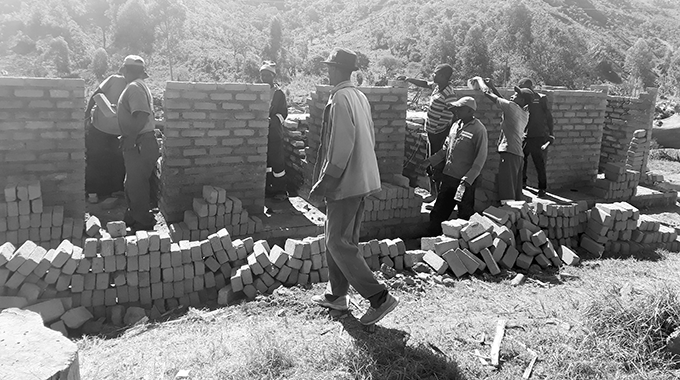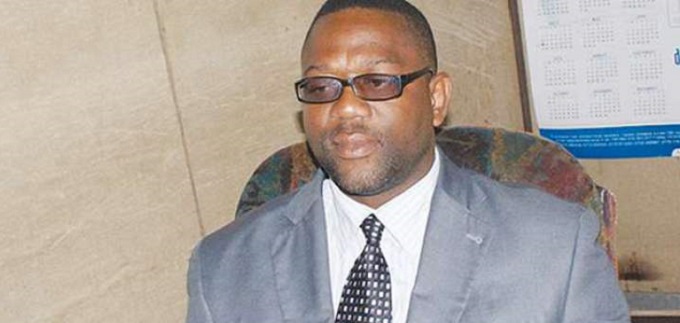Restoring water and sanitation in schools post Cyclone Idai

Roselyne Sachiti, Features Editor
Zimbabwe’s schools opened for the second term on Tuesday May 7, 2019.
In Chimanimani, east of the country, thousands of primary and secondary school children in areas affected by Cyclone Idai also returned after a long break.
As they trickled back, one of the critical challenges their schools came face to face with was that of inadequate water and sanitation as the cyclone indiscriminately damaged water and toilet infrastructure.
At most schools, water pipes were mercilessly uprooted and swept away while toilets were extensively damaged. Some just collapsed.
Assessments carried out by the WASH cluster post disaster revealed that 113 schools had their WASH infrastructure affected by the cyclone, 54 in Buhera, and 35 in Chimanimani. Others are scattered in the province with two out of every three schools reporting loss of sanitation. One in three schools reported loss of water. These schools have a total of 544 squat holes. The number of damaged squat holes is yet to be determined.
When Cyclone Idai hit, large rocks and trees also damaged toilets. At Ngangu Primary, a large tree and huge rocks can be seen blocking the toilet entrances.
Some sections of the walls have collapsed, cracked and roofs blown away. The toilets are not accessible and have since been decommissioned.
Set up by the United Nations Children’s Fund (Unicef) with support from UKAid and the EU, pupils are in the meantime using temporary toilets as the construction of permanent latrines is being carried out.
The temporary toilets consist of squatting trays and black plastic sheets and will be up until when construction of the permanent toilets is completed. This will ensure the health of pupils and teachers.
The support from UKAid and the EU has also enabled Unicef to provide hygiene kits, including buckets, jerry cans, soap and water purification tablets to more than 5000 households in the area to promote good sanitation and health practices.
The Department of Public Works is also on the ground constructing new toilets which are nearing completion and have now reached roof level.
The other extensively damaged block of toilets near the ECD playground is halfway through and contractors are working tirelessly to complete as they race against time.
To ensure inclusivity, four of the new toilets were designed for use by children with physical disabilities.
The school which had 1130 learners lost 32 pupils to the cyclone.
Drinking water is available as Zinwa and their local council also chipped in by providing several water tanks.
Before the intervention, pupils and staff thought they would never come back to school again. They are now adjusting to the new set up and hopes are high as they see construction workers lay brick by brick on the new toilets. Soon they will be able to use them.
At Kwirire Primary School, Chimanimani toilets and water infrastructure was also extensively damaged.
Work to build new toilets is also currently underway while some damaged old toilets were repaired in time for school opening.
“The water supply at the school is no more. Pipes bringing water to the school were swept away by floods. Toilets were also extensively damaged. Ten squatting holes for boys were extremely damaged developing large cracks. They were about to collapse. The four blair toilets for teachers also collapsed,” said school head Mr Twoboy Sithole.
With no drinking water, the 1111 pupils are fetching water from an unprotected source about 100 metres away.
Here, pupils are also using the few repaired toilets to manage the situation as the Department of Public Works builds the new ones.
It is break time and a Grade One pupil, Clive, and his friends stand near the construction workers as if supervising them. He says he wants to be a builder when he grows up but hopes he will be the first to use the toilets when they are complete. Clive adds that once they are complete, he will leave home early so that he beats everyone to using them.
Open defecation is bad, him and his friends say, human excreta will end up in water sources.
A Grade Seven pupil, Chipo, says she hopes water will be restored soon as she needs it for washing hands after using the toilet to stay safe from diarrhoeal diseases like cholera.
She is also happy that new toilets are being constructed.
At Dzingire Primary School in Copa, new additional toilets are also being constructed.
These will ensure the students have adequate latrines. Their water infrastructure was not affected by the floods so pupils have access to safe drinking water at all times.
In various other affected schools, construction is either complete or nearing completion. While the target of completing the toilets was before schools reopened, delays were a result of some learning institutions which were inaccessible because of severely damaged roads. This meant building supplies reached them rather late.
All is not gloom and doom.
A School Improvement Grant totalling US$174 000 has been allocated for 58 of the 62 schools that Unicef is assisting and each school will receive a grant of US$3000.
Headmasters know too well the importance of water and sanitation to education and are treating it as a top priority. Most school heads at institutions affected by the cyclone have been busy opening foreign currency nostro accounts in which the money will be deposited.
Once received the money can also be used by the schools to further repair water and build toilet infrastructure among other things.
“Unicef and partners are rehabilitating sanitation facilities in schools, and restoring community water systems which also serve these schools,” says Unicef Representative to Zimbabwe, Laylee Moshiri.
In post disaster situations, like Cyclone Idai water, sanitation and hygiene (WASH) are fundamental to health and education of the affected children.
Most importantly, education is critical for breaking the cycle of poverty especially after a disaster like Cyclone Idai where most people lost everything.
After natural disasters, lack of clean water has serious effects on student’s academic performance and attendance rates.
In the absence of latrines, teenage girls are likely to miss school during their menstrual cycle as they require a private place to change and dispose menstrual hygiene products.
A lot of stigma is entrenched around periods in many places, and some teen girls would rather fall behind on their studies than risk humiliation.
Luckily for those in Chimanimani, the temporary toilets are giving them the much needed privacy and they can attend school alongside their colleagues.
Sustainable Development Goal 6 aims to ensure availability and sustainable management of water and sanitation for all.
Moreover, the first three targets relate to drinking water, supply and sanitation.
Therefore, toilets at schools are included in the second target “By 2030, achieve access to adequate and equitable sanitation and hygiene for all and end open defecation, paying special attention to the needs of women and girls and those in vulnerable situations.”
Equitable sanitation and hygiene solutions address the needs of school girls.
The fast speed at which government and its development partners are moving at to ensure water and sanitation is restored in schools shows commitment to Section 77 (a) of the Zimbabwean Constitution which guarantees every person right “to safe, clean and portable water.”
Zimbabwe experienced torrential rainfall caused by Cyclone Idai between March 15 and 17, 2019. Cyclone Idai caused high winds and heavy rains in Chimanimani, Chipinge, Buhera, Nyanga, Makoni, Mutare Rural, Bikita, Masvingo and Gutu Districts causing riverine and flash flooding and subsequent deaths, and destruction of livelihoods and property. An estimated 50 000 households/250 000 people, including 120 000 children, were affected by the flooding and landslides after local rivers and their tributaries burst their banks.
The number of affected school children stands at 94 000.
As the pupils concluded their first week and adjusted to the new term after Cyclone Idai, some like witty Clive also anxiously monitored builders waiting to be the first ones to use the new toilets under construction.








Comments